arthritis support
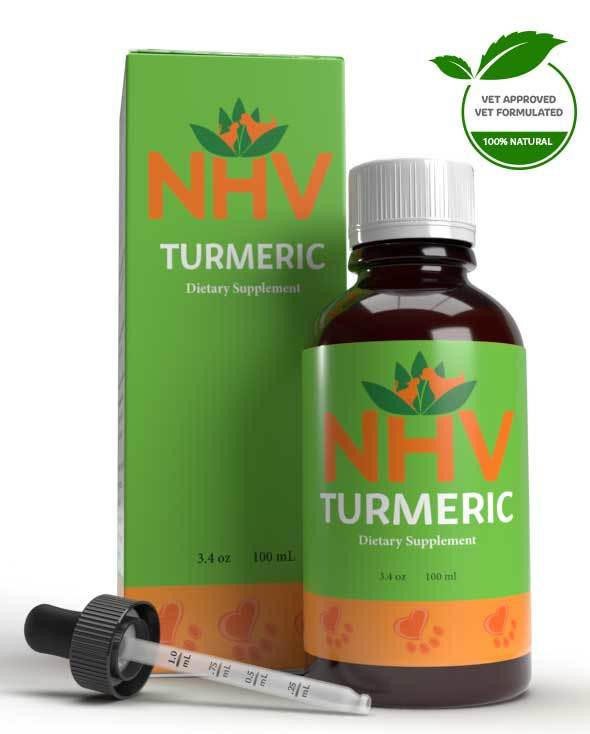
free shipping over $100 (USA & Canada)
1-877-937-4372 the pet expert hotline
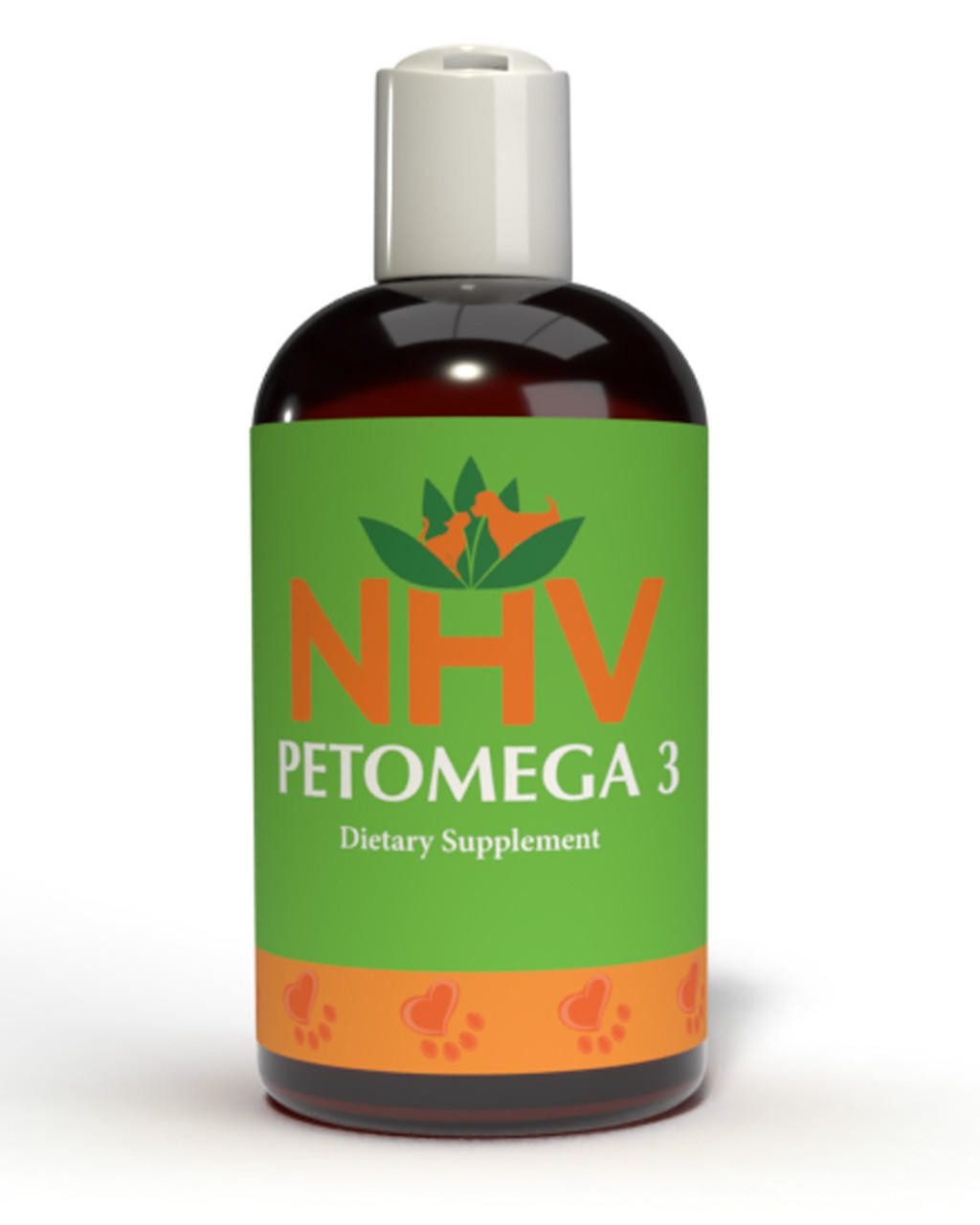
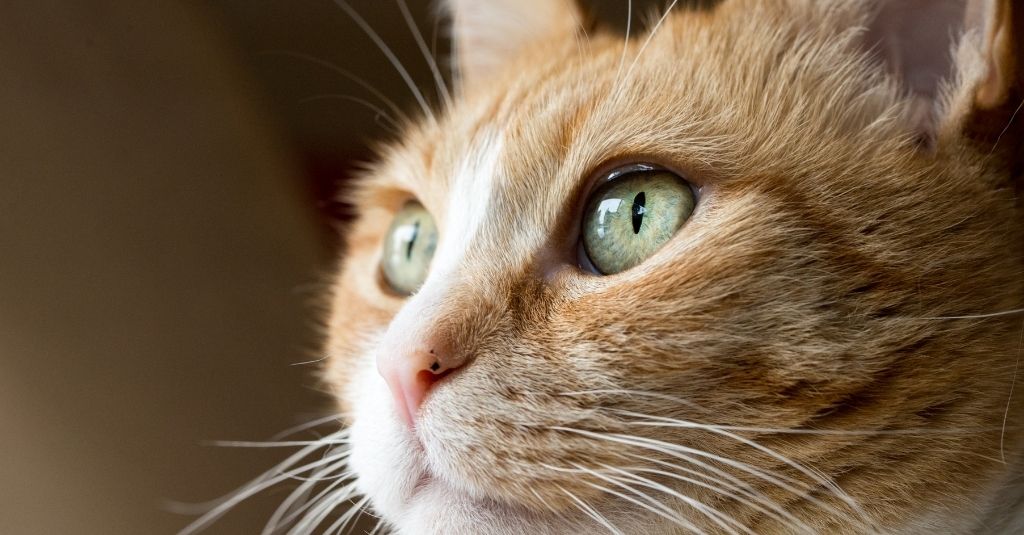
Paying attention to your pet’s eye health can prevent eye diseases from becoming a serious problem. The sooner you take action, the more resources you have to reverse the situation and prevent blindness. In this blog, I will talk a little bit about eye diseases in dogs and cats and how you can support your pet’s eye health.
There are many eye conditions that can affect your furbaby. They can be caused by trauma or can be the secondary result of a disease. The 10 most common eye diseases in dogs and cats are:
Visit a vet right away if you notice a change in your pet’s eye health.
It is important to keep tabs on your little one’s eye health and visit a vet right away if you notice your pet has one of these conditions. Some of these conditions can be serious and your little one may lose their vision or in extreme cases, lose one or both of their eyes.
Flat-faced or brachycephalic breeds like Pugs, Shih Tzus, and Bulldogs, have more exposed eyes. This can result in exposure to keratopathy and corneal dystrophies that may cause discomfort and vision loss.
Some cat breeds lie Persians and Himalayans are prone to corneal sequestrum. A corneal sequestrum is an area of dead corneal tissue and may appear on the cornea as a black spot.
In wild animals, poor husbandry and diet are the most common cause of eye problems.
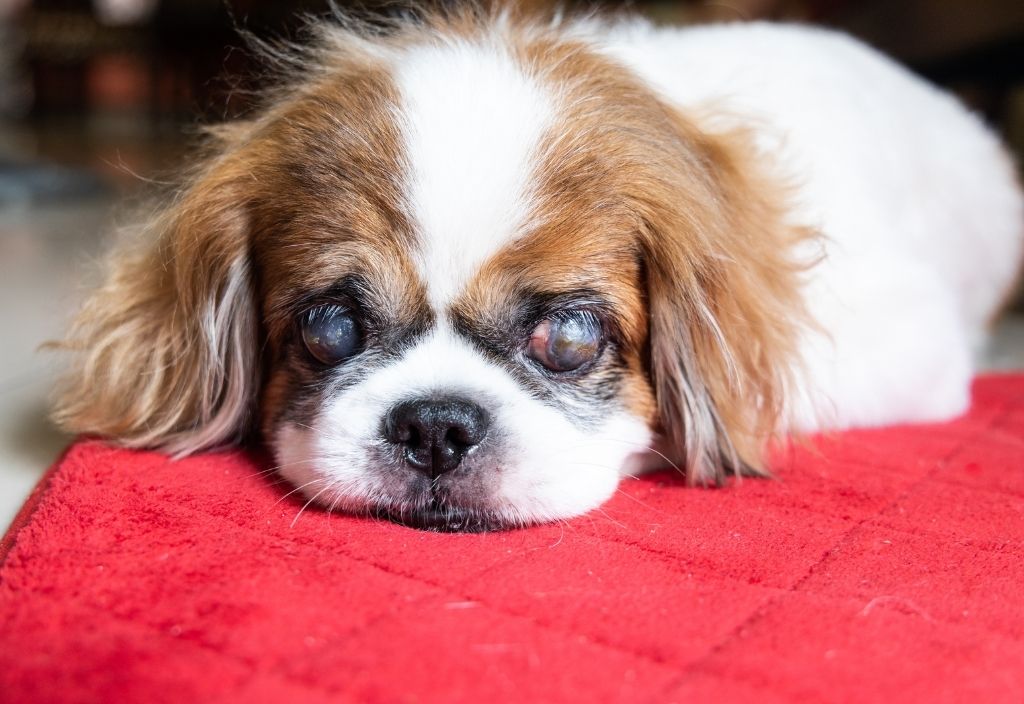
NHV has many supplements that can help your pet’s eyes. Here are some examples:
Many studies have shown eicosapentaenoic acid (EPA) and docosahexaenoic acid (DHA) present in omega 3s can decrease the risk of cataracts. It also can help decrease inflammation related to dry eyes. NHV Petomega 3 is a vet-formulated blend of natural fish oils that are rich in omega 3s.
Turmeric is a powerful antioxidant and anti-inflammatory. It can help prevent oxidative damage, help delay the development of cataracts, and help decrease inflammation. Inflammation plays an important role in many eye diseases in dogs and cats including uveitis, glaucoma, and macular degeneration. NHV Turmeric is an easy-to-administer liquid turmeric supplement that is a safe dosage and bioavailable for pets.
Ey-Eas is a herbal eye drop formula with antibiotic and anti-inflammatory activities that are especially helpful for pink eye (conjunctivitis) and watery eyes. This gentle, non-irritating formula supports the management of painful swelling, helps soothe uncomfortable itching, and helps control increased discharge to restore the eyes back to a healthy state. It also helps prevent the spreading of eye infections to other pets.
Our new supplement, OcuLove, is formulated to help with eye health and promote eyesight. It contains a blend of herbs that have been used for centuries for eye health and have beneficial properties like helping to reduce inflammation and irritation, promoting healthy tear production, and encouraging healthy blood flow in the eyes.
A balanced diet that is adequate for your pet’s health conditions can definitely help with your little one’s health. For example, cataracts may be a secondary condition to diabetes. In this case, a diet formulated for your pet’s diabetes by a veterinarian is beneficial.
Turtles also can suffer from eye problems if their diet is deficient in vitamin A. Therefore, a diet that has the correct amount of vitamin A can be very beneficial.
It is always very important to talk to your vet about the best diet for your little one.
If you have any questions about eye diseases in dogs, cats, or any other pets, please let us know. You can ask our team of pet experts a question now by clicking the button below.
arthritis support

For Arthritis and Cancer Support
buy 2 and save $3
3 month supply for a small to medium size
Dogs love to root around in the dirt for goodies. But did you know one of the best things they could find would be turmeric? Turmeric for Dogs is a natural, antioxidant-rich supplement that supports your pup’s overall wellness.
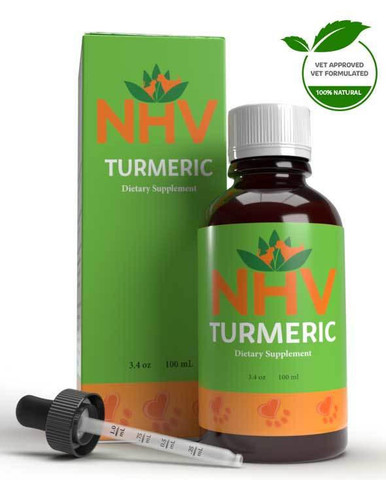
Dogs love to root around in the dirt for goodies. But did you know one of the best things they could find would be turmeric? Turmeric for Dogs is a natural, antioxidant-rich supplement that supports your pup’s overall wellness.
Sadly, your pup won’t find turmeric in their backyards unless you live in the tropics, where this amazing plant grows. However, they can benefit from this golden plant by taking a full-spectrum extract of Turmeric for Dogs.
Is turmeric good for dogs? Yes, most pups can use this safe and gentle herb for a number of health concerns. This is thanks to the organic compounds produced by the plant.
If you’re the pet parent of a sick pup, you might have a challenging journey ahead. Remember that love you feel for your dog will also play a big role, and if you need a little advice, our pet experts are here for you and can be reached by chat.
How does this incredible spice work? Turmeric is rich in antioxidants, which can help your precious pet with stress, pollution, and illness. In the body, Turmeric has the potential to help with both overall.
Pets that are sick have increased oxidation, so the antioxidants they get from food, medication, or supplements can help give them the extra they need.
As pet-parents ourselves, we know you only want the best for your pup. That’s why our extracts are made from human-grade, high quality ingredients. And when you choose NHV Turmeric, you’re choosing decades of holistic pet wellness experience from vets and herbalists who can help support your pet’s wellness journey. Our formula is:
Our turmeric was formulated by a master herbalist and holistic vet. Learn more about Dr. Hillary Cook’s use of turmeric and its benefits for pet health. We are also proud to have been a part of many dog success stories, like with our doggo friend, Captain Morgan.
Captain Morgan’s story: “Our bloodhound has been on turmeric for 2 months now. He has been getting up and down more smoothly and not as stiff in his backend. He loves the taste and we love how it has helped him
You can add daily supplements like Turmeric to top up your dog’s intake of natural, wellness-promoting ingredients. It can be given directly by mouth with the dropper provided, or it can be mixed into food or a favorite treat (this tip is dog-approved)!
All NHV supplements are made with the finest quality organic or ethically harvested herbs. We use non-GMO vegetable glycerin as our base. NHV products are full-spectrum extracts.
Select your pet's weight to determine the correct dose.
To be taken twice daily. Determine your pet’s weight and then use the easy chart below to determine the correct dose. This is the minimum dosage.
Pet's Weight Dosage
0 - 15 lb = 0.5 ml
16 - 30 lb = 1.0 ml
31 - 45 lb = 1.5 ml
46 - 60 lb = 2.0 ml
61 - 75 lb = 2.5 ml
Over 75 lb = 3.0 ml
How to Administer
Shake well before use. The easiest method is to use the dropper provide and places the drops into your pet’s food or favorite treat. You can also use the dropper and squirt directly into the pet’s mouth.
Some pets can be finicky, if this occurs consider hiding the drops in foods most pet’s love such as fish, chicken or yogurt or a favorite treat. If your pet only eats dry food then soak a few kibbles at feeding time.
For Best Results
Herbal dietary supplements are beneficial to the health and wellbeing of your pet and are safe for long-term use. Every pet responds to natural herbal supplements differently, therefore it is important to be consistent and administer the product daily. Supplements generally take two to four weeks to take effect, however this will vary from one animal to the next.
Product Storage
All NHV Natural Pet Products are pure herbal extracts and contain no artificial additives, preservatives or coloring. Shelf life after opening is 6 months and must be refrigerated after opening.
Cautions and Contraindications: Do not use Turmeric in pregnant or nursing animals. Speak to your vet before using our products. A second visit is recommended if your pet’s condition does not improve, or deteriorates after continued use of the supplements.
Sadly, your pup won’t find turmeric in their backyards unless you live in the tropics, where this amazing plant grows. However, they can benefit from this golden plant by taking a full-spectrum extract of Turmeric for Dogs.
Is turmeric good for dogs? Yes, most pups can use this safe and gentle herb for a number of health concerns. This is thanks to the organic compounds produced by the plant.
If you’re the pet parent of a sick pup, you might have a challenging journey ahead. Remember that love you feel for your dog will also play a big role, and if you need a little advice, our pet experts are here for you and can be reached by chat.
How does this incredible spice work? Turmeric is rich in antioxidants, which can help your precious pet with stress, pollution, and illness. In the body, Turmeric has the potential to help with both overall.
Pets that are sick have increased oxidation, so the antioxidants they get from food, medication, or supplements can help give them the extra they need.
As pet-parents ourselves, we know you only want the best for your pup. That’s why our extracts are made from human-grade, high quality ingredients. And when you choose NHV Turmeric, you’re choosing decades of holistic pet wellness experience from vets and herbalists who can help support your pet’s wellness journey. Our formula is:
Our turmeric was formulated by a master herbalist and holistic vet. Learn more about Dr. Hillary Cook’s use of turmeric and its benefits for pet health. We are also proud to have been a part of many dog success stories, like with our doggo friend, Captain Morgan.
Captain Morgan’s story: “Our bloodhound has been on turmeric for 2 months now. He has been getting up and down more smoothly and not as stiff in his backend. He loves the taste and we love how it has helped him
You can add daily supplements like Turmeric to top up your dog’s intake of natural, wellness-promoting ingredients. It can be given directly by mouth with the dropper provided, or it can be mixed into food or a favorite treat (this tip is dog-approved)!
All NHV supplements are made with the finest quality organic or ethically harvested herbs. We use non-GMO vegetable glycerin as our base. NHV products are full-spectrum extracts.
Select your pet's weight to determine the correct dose.
To be taken twice daily. Determine your pet’s weight and then use the easy chart below to determine the correct dose. This is the minimum dosage.
Pet's Weight Dosage
0 - 15 lb = 0.5 ml
16 - 30 lb = 1.0 ml
31 - 45 lb = 1.5 ml
46 - 60 lb = 2.0 ml
61 - 75 lb = 2.5 ml
Over 75 lb = 3.0 ml
How to Administer
Shake well before use. The easiest method is to use the dropper provide and places the drops into your pet’s food or favorite treat. You can also use the dropper and squirt directly into the pet’s mouth.
Some pets can be finicky, if this occurs consider hiding the drops in foods most pet’s love such as fish, chicken or yogurt or a favorite treat. If your pet only eats dry food then soak a few kibbles at feeding time.
For Best Results
Herbal dietary supplements are beneficial to the health and wellbeing of your pet and are safe for long-term use. Every pet responds to natural herbal supplements differently, therefore it is important to be consistent and administer the product daily. Supplements generally take two to four weeks to take effect, however this will vary from one animal to the next.
Product Storage
All NHV Natural Pet Products are pure herbal extracts and contain no artificial additives, preservatives or coloring. Shelf life after opening is 6 months and must be refrigerated after opening.
Cautions and Contraindications: Do not use Turmeric in pregnant or nursing animals. Speak to your vet before using our products. A second visit is recommended if your pet’s condition does not improve, or deteriorates after continued use of the supplements.
eye support
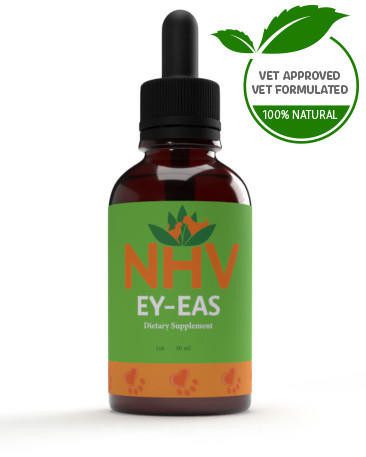
To Manage Uncomfortable Swelling and Restore Eye Health from Pink Eye (Conjunctivitis) and Watery Eyes
buy 2 and save $3
Ey-Eas is a dog eye infection remedy that helps soothe discomfort, stressful eye infections and in dogs due to foreign material, bacteria or viral infections such as pink eye (conjunctivitis).

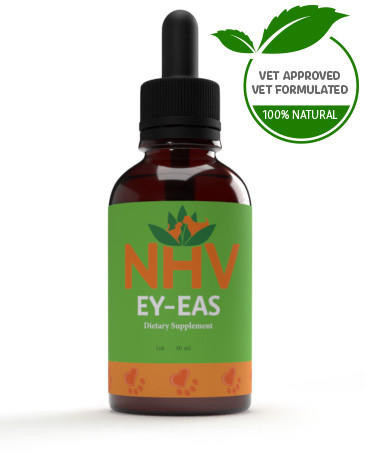
Ey-Eas is a dog eye infection remedy that helps soothe discomfort, stressful eye infections and in dogs due to foreign material, bacteria or viral infections such as pink eye (conjunctivitis).

Dogs may be prone to eye infections that cause discomfort and long-term damage if left untreated. Ey-Eas is a dog eye infection remedy that helps dogs with eyes that are red, cloudy, or bulging. It is also helpful for dogs that are continually rubbing their eyes, tearing excessively, or avoiding light. Conjunctivitis can occur in one or both eyes and is most often the result of a bacterial or viral infection.
Other possible causes include allergies, irritants, and fungal infections. If only one eye is affected, then it may be an inflamed tear sac or a foreign object causing the problem. Do not use with existing corneal ulcers.
Chamomile – An excellent calming agent.
Eye Bright – Reduces inflammation and contains strong astringent properties.
Goldenseal – An anti-inflammatory and decongestant that exhibits a broad spectrum of antibiotic activity that works as a dog eye infection natural remedy.
Rosemary – Has anti-inflammatory and antiseptic properties.
Ey-Eas can be used orally or topically.
ORALLY: To be taken twice daily.
1 drops for every 2lb of body weight up to 50 lb.
TOPICALLY: Using the dropper place a few drops in each eye.
Shaking of the head and rubbing of the eyes is normal.
How to Administer
Shake well before use. The easiest method is to use the dropper provide and places the drops into your pet’s food or favorite treat. You can also use the dropper and squirt directly into the pet’s mouth.
Some pets can be finicky, if this occurs consider hiding the drops in foods most pet’s love such as fish, chicken or yogurt or a favorite treat. If your pet only eats dry food then soak a few kibbles at feeding time.
For Best Results
Herbal dietary supplements are beneficial to the health and wellbeing of your pet and are safe for long-term use. Every pet responds to natural herbal supplements differently, therefore it is important to be consistent and administer the product daily. Supplements generally take two to four weeks to take effect, however this will vary from one animal to the next.
Product Storage
All NHV Natural Pet Products are pure herbal extracts and contain no artificial additives, preservatives or coloring. Shelf life after opening is 6 months and must be refrigerated after opening.
Cautions and Contraindications
Do not use Ey-Eas in pregnant or nursing animals. When used topically the pet may shake it’s head or rub its eyes and face for a short time; this normal. Speak to your vet before using our products. A second visit is recommended if your pet’s condition does not improve, or deteriorates after continued use of the supplements.
All information provided by NHV Natural Pet Products is for educational purposes only.
Dogs may be prone to eye infections that cause discomfort and long-term damage if left untreated. Ey-Eas is a dog eye infection remedy that helps dogs with eyes that are red, cloudy, or bulging. It is also helpful for dogs that are continually rubbing their eyes, tearing excessively, or avoiding light. Conjunctivitis can occur in one or both eyes and is most often the result of a bacterial or viral infection.
Other possible causes include allergies, irritants, and fungal infections. If only one eye is affected, then it may be an inflamed tear sac or a foreign object causing the problem. Do not use with existing corneal ulcers.
Chamomile – An excellent calming agent.
Eye Bright – Reduces inflammation and contains strong astringent properties.
Goldenseal – An anti-inflammatory and decongestant that exhibits a broad spectrum of antibiotic activity that works as a dog eye infection natural remedy.
Rosemary – Has anti-inflammatory and antiseptic properties.
Ey-Eas can be used orally or topically.
ORALLY: To be taken twice daily.
1 drops for every 2lb of body weight up to 50 lb.
TOPICALLY: Using the dropper place a few drops in each eye.
Shaking of the head and rubbing of the eyes is normal.
How to Administer
Shake well before use. The easiest method is to use the dropper provide and places the drops into your pet’s food or favorite treat. You can also use the dropper and squirt directly into the pet’s mouth.
Some pets can be finicky, if this occurs consider hiding the drops in foods most pet’s love such as fish, chicken or yogurt or a favorite treat. If your pet only eats dry food then soak a few kibbles at feeding time.
For Best Results
Herbal dietary supplements are beneficial to the health and wellbeing of your pet and are safe for long-term use. Every pet responds to natural herbal supplements differently, therefore it is important to be consistent and administer the product daily. Supplements generally take two to four weeks to take effect, however this will vary from one animal to the next.
Product Storage
All NHV Natural Pet Products are pure herbal extracts and contain no artificial additives, preservatives or coloring. Shelf life after opening is 6 months and must be refrigerated after opening.
Cautions and Contraindications
Do not use Ey-Eas in pregnant or nursing animals. When used topically the pet may shake it’s head or rub its eyes and face for a short time; this normal. Speak to your vet before using our products. A second visit is recommended if your pet’s condition does not improve, or deteriorates after continued use of the supplements.
All information provided by NHV Natural Pet Products is for educational purposes only.
Cat Eye Health
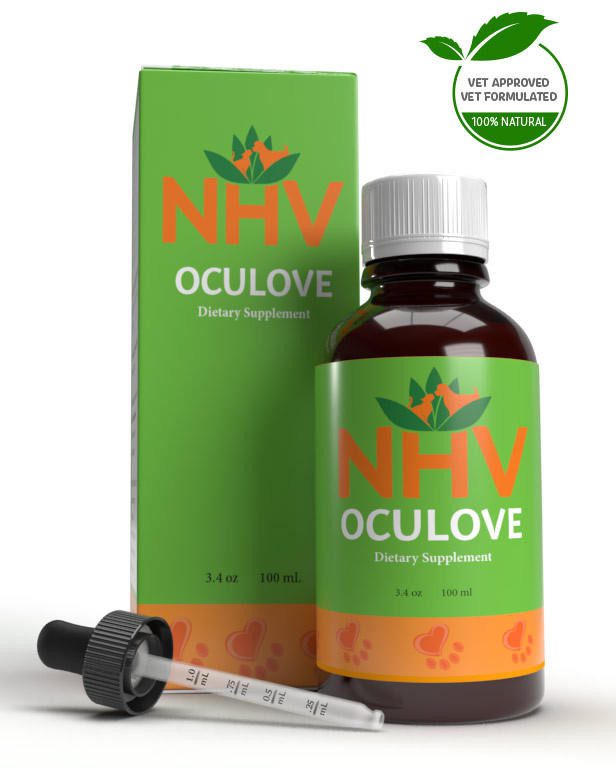
Natural Cat Eye Health Supplement
buy 2 and save $3
3 month supply for a small to medium size pet.
Have you ever watched your kitty’s hypnotic eyes as they dart around the room stalking their favorite toy? Their eyes are definitely one of their most defining feline features! That's why, as a pet parent, it can be very worrisome to see your furry friend’s eyes change from crystal-clear to cloudy or watery. NHV OcuLove is an internal cat eye health supplement that can help support common feline eye problems like corneal damage, cataracts, glaucoma or even infections like pink eye.

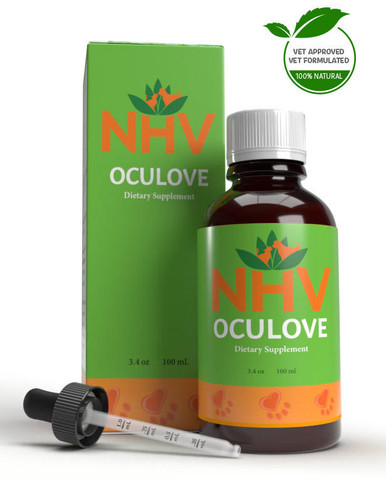
Have you ever watched your kitty’s hypnotic eyes as they dart around the room stalking their favorite toy? Their eyes are definitely one of their most defining feline features! That's why, as a pet parent, it can be very worrisome to see your furry friend’s eyes change from crystal-clear to cloudy or watery. NHV OcuLove is an internal cat eye health supplement that can help support common feline eye problems like corneal damage, cataracts, glaucoma or even infections like pink eye.

Support for Eye Health in Cats (kittens and adults)
Who doesn’t love looking into their cat’s eyes? Whether they are sapphire blue, bright green or maybe even odd-eyed (two different colored eyes). But it can be very worrying to see redness, discharge or irritated blinking. What's going on? Your kitty could be suffering from common feline eye problems like blepharitis (common in Persians and Himalayans) or keratitis (inflamed cornea). OcuLove, a natural cat eye health supplement contains all-natural herbal ingredients known to improve degenerative eye disease, eye infections and support overall eye health. Formulated with herbal extracts like bilberry, eyebright and ginkgo, which have been used for over millennia to improve circulation and oxygenation in the eyes. OcuLove is also beneficial for conditions like pink eye (conjunctivitis), corneal damage, eye inflammation (uveitis) and glaucoma (optical nerve damage).
How NHV OcuLove Cat Eye Health Supplement Supports Eye Health in Kittens and Adult Cats
Like humans, your kitty may suffer from common feline eye problems during their lifetime. An underlying infection often causes conditions like glaucoma or cataracts so ingredients like oregon grape, turmeric and wheatgrass contain anti-inflammatory properties helpful for encouraging healthy eye function. Other ingredients like eyebright, bilberry and gingko help to soothe inflammation (blepharitis, keratitis) and may enhance blood circulation around the eyes. Gingko biloba is known for improving oxygenation in the blood and improving eye conditions like corneal tearing, corneal inflammation, glaucoma, cataracts, dry eyes, conjunctivitis (pink eye) and eye issues in general.
Help your Cat Live A Long And Happy Life, Naturally!
We are always here to support you and your pet! Made with full-spectrum plant extracts which are bioavailable for your furry friend and 100% natural, NHV pet experts are here to answer any eye health-related questions. If you notice any cloudiness, redness, itchiness or discharge from your kitty’s eyes, get in touch with your vet immediately.
Made with the finest, organically grown, or ethically harvested herbs. Made specifically for pets, vet-formulated and vet approved.
Bilberry — Contains anthocyanins which may help improve circulation and blood flow around the eyes. Studies have shown that bilberry is helpful with glaucoma, corneal damage, conjunctivitis (pink eye), and overall issues that affect the eye.
Eyebright — Contains anti-inflammatory properties. It has been used for centuries to help with itchy eyes and inflammation of the eyelid and blood vessels.
Gingko — Has a long history of being used to enhance oxygenation around the eyes and in the body, and is beneficial for conditions like glaucoma.
Wheatgrass — Contains twice as much vitamin A compared to carrots so it's beneficial for eye health. It may soothe inflammation and fight infections of the eye.
Turmeric — Contains antioxidant, anti-inflammatory properties that help fight oxidative stress and slow down overall eye deterioration.
Oregon grape — Is beneficial for fighting eye infections and may help improve overall eye health and support the immune system.
Select your pet's weight to determine the correct dose.
To be taken twice daily. Determine your pet’s weight and then use the easy chart below to determine the correct dose. This is the minimum dosage.
Pet's Weight Dosage
0 - 15 lb = 0.5 ml
16 - 30 lb = 1.0 ml
31 - 45 lb = 1.5 ml
46 - 60 lb = 2.0 ml
61 - 75 lb = 2.5 ml
Over 75 lb = 3.0 ml
Some pets may require a larger dosage due to their metabolism. You can safely double the recommended dosage.
How to Administer
Shake well before use. Use the dropper provided to squirt the dosage directly into your pet’s mouth along the gums and teeth. Some pets may be finicky and resist your attempts to administer drops directly into their mouth. If this occurs, try placing the drops in your pet’s food or favorite treat. You may want to consider hiding the drops in foods most pet’s love such as fish, chicken, or yogurt. When serving dry food, use the dropper to soak a few kibbles at feeding time.
For Best Results
Herbal dietary supplements are beneficial to the health and wellbeing of your pet and are safe for long-term use. Every pet responds to natural herbal supplements differently, therefore it is important to be consistent and administer the product daily. Supplements generally take two to four weeks to take effect, however this will vary from one animal to the next.
Product Storage
All NHV Natural Pet Products are pure herbal extracts and contain no artificial additives, preservatives or coloring. Shelf life after opening is 6 months and must be refrigerated after opening.
Cautions and Contraindications
Do not use Mouth Drops in pregnant or nursing animals. Speak to your vet before using our products. A second visit is recommended if your pet’s condition does not improve, or deteriorates after continued use of the supplements.
All information provided by NHV Natural Pet Products is for educational purposes only.
Support for Eye Health in Cats (kittens and adults)
Who doesn’t love looking into their cat’s eyes? Whether they are sapphire blue, bright green or maybe even odd-eyed (two different colored eyes). But it can be very worrying to see redness, discharge or irritated blinking. What's going on? Your kitty could be suffering from common feline eye problems like blepharitis (common in Persians and Himalayans) or keratitis (inflamed cornea). OcuLove, a natural cat eye health supplement contains all-natural herbal ingredients known to improve degenerative eye disease, eye infections and support overall eye health. Formulated with herbal extracts like bilberry, eyebright and ginkgo, which have been used for over millennia to improve circulation and oxygenation in the eyes. OcuLove is also beneficial for conditions like pink eye (conjunctivitis), corneal damage, eye inflammation (uveitis) and glaucoma (optical nerve damage).
How NHV OcuLove Cat Eye Health Supplement Supports Eye Health in Kittens and Adult Cats
Like humans, your kitty may suffer from common feline eye problems during their lifetime. An underlying infection often causes conditions like glaucoma or cataracts so ingredients like oregon grape, turmeric and wheatgrass contain anti-inflammatory properties helpful for encouraging healthy eye function. Other ingredients like eyebright, bilberry and gingko help to soothe inflammation (blepharitis, keratitis) and may enhance blood circulation around the eyes. Gingko biloba is known for improving oxygenation in the blood and improving eye conditions like corneal tearing, corneal inflammation, glaucoma, cataracts, dry eyes, conjunctivitis (pink eye) and eye issues in general.
Help your Cat Live A Long And Happy Life, Naturally!
We are always here to support you and your pet! Made with full-spectrum plant extracts which are bioavailable for your furry friend and 100% natural, NHV pet experts are here to answer any eye health-related questions. If you notice any cloudiness, redness, itchiness or discharge from your kitty’s eyes, get in touch with your vet immediately.
Made with the finest, organically grown, or ethically harvested herbs. Made specifically for pets, vet-formulated and vet approved.
Bilberry — Contains anthocyanins which may help improve circulation and blood flow around the eyes. Studies have shown that bilberry is helpful with glaucoma, corneal damage, conjunctivitis (pink eye), and overall issues that affect the eye.
Eyebright — Contains anti-inflammatory properties. It has been used for centuries to help with itchy eyes and inflammation of the eyelid and blood vessels.
Gingko — Has a long history of being used to enhance oxygenation around the eyes and in the body, and is beneficial for conditions like glaucoma.
Wheatgrass — Contains twice as much vitamin A compared to carrots so it's beneficial for eye health. It may soothe inflammation and fight infections of the eye.
Turmeric — Contains antioxidant, anti-inflammatory properties that help fight oxidative stress and slow down overall eye deterioration.
Oregon grape — Is beneficial for fighting eye infections and may help improve overall eye health and support the immune system.
Select your pet's weight to determine the correct dose.
To be taken twice daily. Determine your pet’s weight and then use the easy chart below to determine the correct dose. This is the minimum dosage.
Pet's Weight Dosage
0 - 15 lb = 0.5 ml
16 - 30 lb = 1.0 ml
31 - 45 lb = 1.5 ml
46 - 60 lb = 2.0 ml
61 - 75 lb = 2.5 ml
Over 75 lb = 3.0 ml
Some pets may require a larger dosage due to their metabolism. You can safely double the recommended dosage.
How to Administer
Shake well before use. Use the dropper provided to squirt the dosage directly into your pet’s mouth along the gums and teeth. Some pets may be finicky and resist your attempts to administer drops directly into their mouth. If this occurs, try placing the drops in your pet’s food or favorite treat. You may want to consider hiding the drops in foods most pet’s love such as fish, chicken, or yogurt. When serving dry food, use the dropper to soak a few kibbles at feeding time.
For Best Results
Herbal dietary supplements are beneficial to the health and wellbeing of your pet and are safe for long-term use. Every pet responds to natural herbal supplements differently, therefore it is important to be consistent and administer the product daily. Supplements generally take two to four weeks to take effect, however this will vary from one animal to the next.
Product Storage
All NHV Natural Pet Products are pure herbal extracts and contain no artificial additives, preservatives or coloring. Shelf life after opening is 6 months and must be refrigerated after opening.
Cautions and Contraindications
Do not use Mouth Drops in pregnant or nursing animals. Speak to your vet before using our products. A second visit is recommended if your pet’s condition does not improve, or deteriorates after continued use of the supplements.
All information provided by NHV Natural Pet Products is for educational purposes only.
Published: February 22, 2022